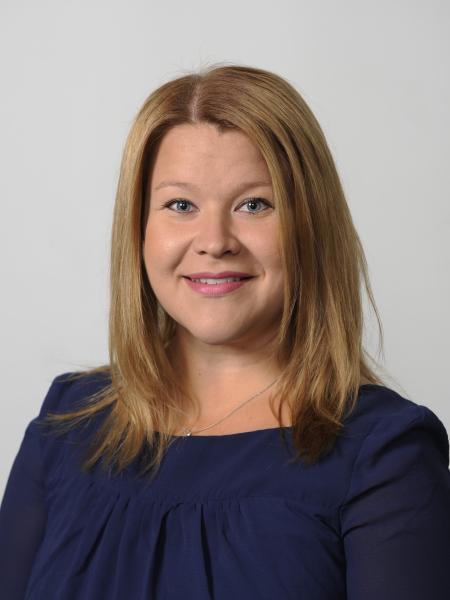Dissertation: Stakeholder voices add credibility to annual report texts – but polyphony is still illusory

– In the texts of an annual report, the voices of both internal and external stakeholders are used to evidence, provide background information and evaluate what the narrator-editor is presenting. In addition, internal stakeholder voices have a role to play in elaborating information and in suggesting cause or effect, says Machaal who will defend her dissertation on 28 January.
An annual report is an informative and promotional text, one of the functions of which is to build and strengthen the image and reputation of the company. The annual reports of listed companies are therefore important texts, carefully designed with their readership in mind. The stakeholder voices used in the texts have been given a number of roles, which aim to influence the reader in one way or another.
Machaal's doctoral dissertation examined the quotations in the narrative section of annual reports, i.e. direct speech and free direct speech. Her research focuses on how meanings are constructed by linguistic means, and what kind of rhetorical tasks the voices have on the structural level of the text. The texts give a voice to customers, for example, and are therefore obviously polyphonic.
– By borrowing different voices, different perspectives can be brought to the text – just as in news texts. However, the voices quoted in an annual report do not contradict the voice of the narrator-editor or other quoted voices. It can be said that, in this sense, the polyphony of annual reports is monophonic and illusory, since the voices are all in harmony.
Stakeholder voices create a positive image
This research shows that the voices of international stakeholders build an image of a company that thinks strategically, acts strategically, creates success and growth and acts responsibly. It also creates an image where the company’s employees are experts, and the product or service is competitive.
The voices of external stakeholders also build a positive image of the company and create an image of cooperation and trust. Since the company itself decides who gets to speak in the annual report, this can be thought of as a strategic representation of reality. The strategic thinking of customer companies is also highlighted in the annual report in order to demonstrate to the reader that the company is responding to the needs and expectations of the customer.
Voices have rhetorical functions
In well-designed texts such as annual reports, the structure is well-established, and different parts of the text have different rhetorical aims.
Stakeholder voices can be used in texts for a variety of purposes. For example, the voices of internal stakeholders act as witnesses. The aim is to reinforce the reader’s belief in the company’s strategic activities and strategy, and in its ability to create growth and success. While the voices of internal stakeholders provide background, the aim is to increase understanding of the company’s choices and actions.
The voices of external stakeholders act as evaluators, for example, to reassure the reader of the text about the sales and market success of the company's product or service, to demonstrate customer satisfaction and to reassure the reader of the text about the responsibility of the company publishing the annual report.
An annual report is a type of text used in investor communications, and the use of multiple voices supports the communication objectives of investor communications and the annual report. Shareholder voices help bridge the gap between those who know and those who do not, i.e. they help to reduce information asymmetry. Voices are also used to build trust, increase transparency and demonstrate the value and competence of the company.
The results of Sanna Machaal's doctoral research provide concrete and researched information for corporate communication professionals, communication agencies and communication teachers on the role of direct or free direct speech, how to use it and how stakeholder voices play a role in the narrative section of the annual reports of listed companies.
If used in a text, direct or free direct presentation can contribute to the implementation of the company's communication strategy, which in turn supports and serves the strategy of the company as a whole. It is not only a resource for news or press articles but also has a role to play in the narrative section of the annual reports of listed companies.
Data for the study consisted of 23 annual reports, which were examined using the tools provided by systemic-functional language theory and rhetorical structure theory.
Doctoral dissertation
Machaal, Sanna (2022) Sidosryhmien äänet pörssiyhtiöiden vuosikertomusten narratiivisen osion resurssina: tarkastelussa suora esitys ja vapaa suora esitys. Acta Wasaensia 479. Väitöskirja / Doctoral dissertation. Vaasan yliopisto / University of Vaasa.
Publication pdf: https://urn.fi/URN:ISBN:978-952-395-007-8
Public defence
The public examination of MA Sanna Machaal’s doctoral dissertation ” Sidosryhmien äänet pörssiyhtiöiden vuosikertomusten narratiivisen osion resurssina : tarkastelussa suora esitys ja vapaa suora esitys” will be held on Friday 28.1.2022 at 12 at the University of Vaasa.
The defence will be organised onlinehttps://uwasa.zoom.us/j/64417168162?pwd=OHlSYlg1QlMyVVhyMlg1U3ZXeFVZQT09
Password: 972520
Docent, Ph.D. Johanna Komppa (University of Helsinki) will act as an opponent and Professor Merja Koskela as a custos. The public defence will be held in Finnish.
Further information
Sanna Machaal, tel +358 29 449 8386, email sanna.machaal(at)uwasa.fi
Sanna Machaal graduated from the University of Vaasa in 2010 with an M.Phil. degree. She is currently a university teacher of Finnish at the Linginno Language Centre of the University of Vaasa.
